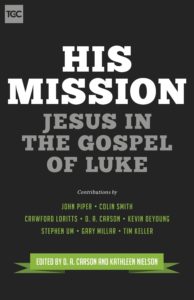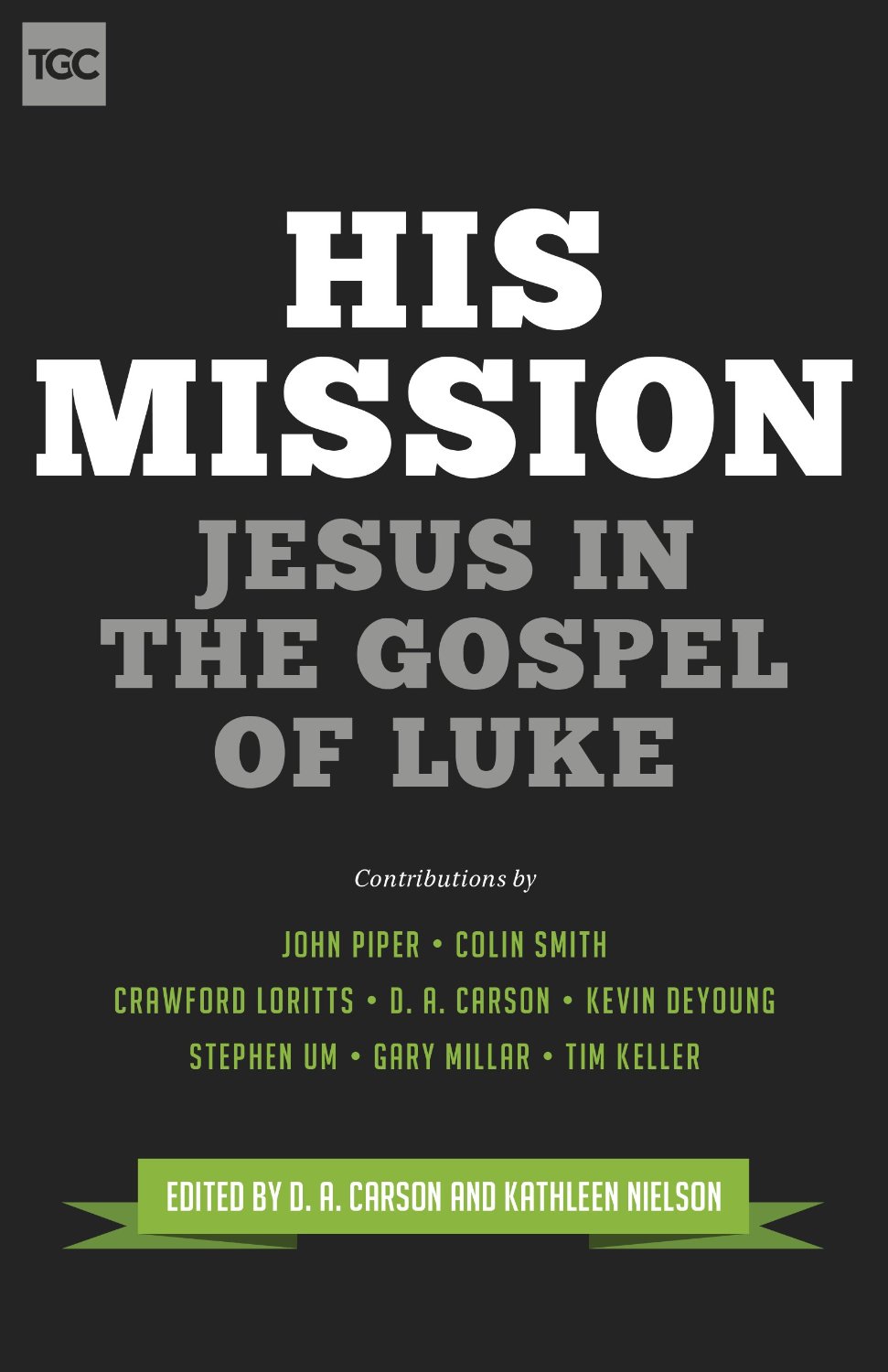 This week’s Book Review is on His Mission: Jesus in the Gospel of Luke, ed. by D. A. Carson and Kathleen Nielson (TGC/Crossway, 2015).
This week’s Book Review is on His Mission: Jesus in the Gospel of Luke, ed. by D. A. Carson and Kathleen Nielson (TGC/Crossway, 2015).
Thanks to Crossway’s generosity, we are cooperating to giveaway one free copy of His Mission. Enter below.
This new work is a truly pleasure to read and an excellent source of pastoral exposition and application of Luke’s Gospel. Contributors include John Piper on Luke 1-2, Colin Smith on the sermon at Nazareth (Luke 4:14-30), Crawford Loritts on Jesus’ power toward the afflicted (Luke 8:26-56), D. A. Carson on Jesus’ resolve to head toward Jerusalem (9:18-62), Kevin DeYoung on Jesus’ mission to save the lost (Luke 15:1-32), Steven Um on Jesus and money (16:1-15), Gary Millar on Jesus’ betrayal and crucifixion (22:39-23:49), and Tim Keller on Jesus’ vindication in Luke 24.
This set of sermons arose out of the April 2013 Gospel Coalition conference, which was set around the Gospel of Luke and particularly the question of whether Jesus preached the gospel. As Carson notes in the preface, many theologians and pastors have found it fashionable in recent decades to talk about the coming of the kingdom of God being the gospel, which Jesus preached, while Paul’s message about justification for individuals is subsidiary. This creates a dilemma: which is the true gospel, which necessitates answer the question of whether Jesus or Paul is more authoritative. Here we have the old canon within the canon issue arising in a different form. But pitting Paul against Jesus is not new, since it occurs frequently in modern ethical debates.
The sermons themselves avoid this debate and stick with a straightforward exposition of their passages. Each sermon, as expected from such preachers, exposits the meaning of the text well and moves toward illustrating it for their hearers and applying it to modern life. Refreshing in these sermons were the centrality of God and Christ as the focus of attention. Piper’s sermon is no surprise to do so with his usual God-centeredness, but Colin Smith himself makes a point of his sermon that “Jesus preached himself.” He notes, “Christ preached himself, and we must do the same. What good will your sermon do, what hope or comfort can it bring, if Christ is not in it?” (29). The other sermons are no less Christ-centered. And this was a relief to see since it seems to me that the TGC devotees can often be found talking more about (and seemingly living more for) the gospel than for God, his Son, and his Spirit. There was no reification of the gospel in this set of sermons, and Christ was central.
Of course this quotation by Smith brings to mind the difficulties of cross-disciplinary study (which preaching most definitely is, as a cross between biblical theology, systematic theology, philosophy, practical theology, counseling, and more!). Was Jesus really “preaching himself” at Nazareth in Luke 4? To an extent, yes, but it seems to focus is more on what God is doing through him to fulfill the OT expectations of Jubilee (which Smith does well to explain, admirably). Perhaps a better question is whether our modern-day application from Luke 4 should be to “preach Jesus.” One might wonder whether this is “right application, wrong text,” since the focus is on Jubilee. No doubt, Jesus brings the fulfillment as God works through him, but the emphasis seems quite clearly to be on the poor, miserable, oppressed, and downtrodden and the redemption drawing nigh for them. Well, one could quibble that I’m being too dichotomous, breaking apart the mission from the agent, so I leave it as no more than a thought to contemplate as we always seek to be as faithful as possible in our cross-disciplinary study.
The really interesting section of this book was the transcript of the Conference Panel with Carson, Keller, Piper, and DeYoung on the topic “Did Jesus Preach the Gospel?” Carson moderated and guided the discussion while the other three worked through some issues, much of it on-the-fly. Carson notes that they did some reading on the subject beforehand to prepare some thoughts, but the discussion did seem quite raw and more of a process to think through the issues involved.
The main issue is whether Jesus preached the gospel (of his sacrificial death for individuals and their justification, sanctification, and glorification) or whether he simply preached the kingdom (or, whether the preaching of the kingdom is the true gospel, while Paul’s gospel is subsidiary). While many helpful points were made, there was a strand of thought, mostly from Piper, that we should not read the Gospels through the lens of Paul or vice versa (this conversation began when DeYoung read a quotation from Pennington’s latest Reading the Gospels Wisely to the effect that the Gospels should be the lens for Paul, to which all the panelists were mostly objecting). Piper makes the comment that he does not really care where one starts (which was Pennington’s concern), but where one ends.
Now, I found this an odd statement, because it really must presuppose that we already know where we are supposed to end. If we judge our theological method by our conclusions, how is the entire process not circular? Why come up with a theological method at all if we already know what the conclusions should look like? I assume Piper referred to the content of one’s conclusions and not the aesthetic or liturgical appeal of one’s conclusions, although perhaps I am wrong. There is not enough explicitly said to be sure. But if I have understood him correctly–and DeYoung and Keller seem to have gone along with him–then I would have to disagree. I share his concern that both must be mutually informing, but you cannot read both in isolation (or read them as perfectly mutually informing) and then allow them to interpret one another because inevitably one will become primary or one’s meaning will be established before the other, and it will therefore become a lens for the other. It’s not that one should not make one a lens for the other, but it’s that it must inevitably happen. Even if one works for decades to allow them to be mutually informing, one will still have been primary at some point and allowed for certain interpretations in the other corpus that then reinforce one’s original interpretations in the other corpus and so forth.
In sum, I found the Conference Panel stimulating to read and thought provoking, and probably most of it was quite agreeable. The sermons were also stimulating, but in a sermonic way that confronted me with Scripture and the Christ that abounds in it. I was challenged, encouraged, and provoked by these penetrating sermons on the Gospel of Luke and recommend you allow yourself to be also. Find the paperback version here, or if you’re out of bookshelf space, get the Kindle version here. And don’t forget to enter our giveaway of one free copy of His Mission. For a few other thoughts on this work, be sure to check out my other post over at Books At a Glance.
Win His Mission: Jesus in the Gospel of Luke, ed. Carson/Nielson


One comment